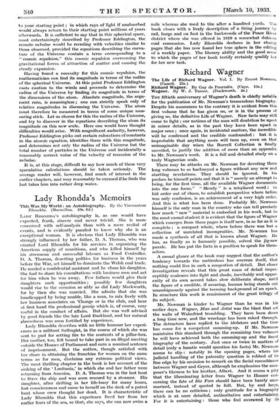Lady Rhondda's Memoirs
This Was My World : an Autobiography. By the Viscountess Rhondda. (Macmillan. 10s. ed.) LADY RHONDDA'S autobiography is, as one would have expected, frank, sincere and never trivial. She is more concerned with self-analysis than with a mere recital of events, and is evidently puzzled to know why she is an exceptional woman. It is obvious that Lady Rhondda was strongly influenced by her father, D. A. Thomas, who was created Lord Rhondda for his services in organizing the American supply of munitions, and who killed himself by his strenuous and successful labours as Food Controller. D. A. Thomas, deserting politics for business in the years before the War, set himself to dominate the Welsh coal trade. lie needed a confidential assistant and he chose his daughter. She had to share his consultations with business men and act for him when he was away. Few fathers would give their daughters such opportunities ; possibly few daughters would rise to the occasion so ably as did Lady Mackworth, for by then she was married. She admits that she was handicapped by being unable, like a man, to mix freely with her business associates on 'Change or in the club, and hear at first hand the professional gossip which is, of course, very useful in the conduct of affairs. But she was well advised by good friends like the late Lord Buckland, and her natural shrewdness was soon fortified by experience.
• Lady Rhondda describes with no little humour her experi- ences as a militant Suffragist, in the course of which she was sent to gaol for setting fire to the contents of a pillar-box. Her mother, too, felt bound to take part in an illegal meeting outside the Houses of Parliament and earn a nominal sentence of imprisonment. But the author, though satisfied with her share in obtaining the franehize for women on the same terms as for men, disclaims any extreme political views. The most thrilling chapter in the book is her account of the sinking of the ` Lusitania,' in which she and her father were returning from America. D. A. Thomas was in the last boat to leave the ship and was soon rescued by a steamer. His daughter, after drifting in her life-buoy for many hours, lost consciousness and came to herself on the deck of a patrol boat whose crew thought her dead. It is characteristic of Lady Rhondda that this experience freed her from her earlier fears of the sea, so that, she says, she can now swim a
mile whereas she used to tire after a hundred yards. The book closes with a lively description of a tiring journey by rail, barge and on foot in the backwoods of the Peace River district where she was offered in 1919 a somewhat dubious coal concession. Lady Rhondda declares in her closing pages that she has now found her true sphere in the editing of a weekly paper. The literary ability and the good sense to which the pages of her book testify certainly qualify her for her new task.






































 Previous page
Previous page